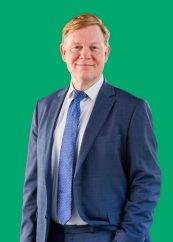Disciplinary law
Robert Sanders is an expert in disciplinary law, and within the corporate law practice at De Clercq he assists in particular independent professionals with disciplinary rules in their field, such as lawyers, civil-law notaries, accountants and healthcare professionals. He likes to analyse content in detail, as this enables him to use the knowledge and insights he has acquired to help his clients.
Education and career
Following his law studies at Leiden University and after completing his military service as a reserve officer in the Royal Air Force, Robert embarked upon his civilian career in 1995 as an editor and publisher. He worked at three leading publishing houses over the course of 14 years, focusing on publishing medical, tax, financial and legal journals, among other things. In the meantime, he also completed his Bachelor’s degree in History (cum laude) at Utrecht University. In 2009, Robert switched to the Dutch Bar Association, where he mainly worked on disciplinary cases for more than six years, initially as a senior policy advisor and subsequently as an attorney. In 2017, Robert received his doctorate in Disciplinary Law for lawyers from the University of Amsterdam.
Robert’s daily practice
‘As an attorney, I am committed to helping independent professionals who are dealing with a complaint or claim that may result in disciplinary proceedings and/or a professional liability claim. First of all, I investigate the lawfulness and reasonableness of the complaint or claim. This is important, because in practice, two-thirds of all disciplinary claims are eventually proved to be unfounded. Naturally, I consult with my client to determine a suitable strategy. Wherever possible, I aim for a case to be resolved by mutual agreement, sometimes succeeding in convincing the opposing party of the untenability of their claim based on arguments, and sometimes by reaching a settlement. As far as I am concerned, going to the disciplinary court is a last resort, but I will not hesitate to take that step if it proves necessary.’

